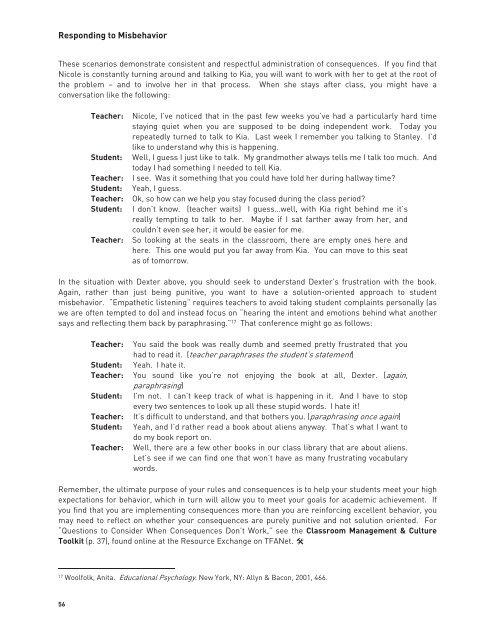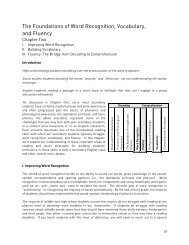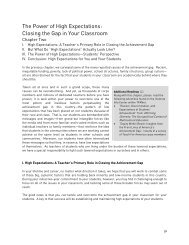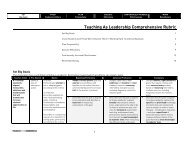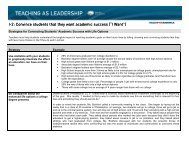Responding to Misbehavior - Teaching As Leadership
Responding to Misbehavior - Teaching As Leadership
Responding to Misbehavior - Teaching As Leadership
Create successful ePaper yourself
Turn your PDF publications into a flip-book with our unique Google optimized e-Paper software.
<strong>Responding</strong> <strong>to</strong> <strong>Misbehavior</strong><br />
These scenarios demonstrate consistent and respectful administration of consequences. If you find that<br />
Nicole is constantly turning around and talking <strong>to</strong> Kia, you will want <strong>to</strong> work with her <strong>to</strong> get at the root of<br />
the problem – and <strong>to</strong> involve her in that process. When she stays after class, you might have a<br />
conversation like the following:<br />
56<br />
Teacher: Nicole, I’ve noticed that in the past few weeks you’ve had a particularly hard time<br />
staying quiet when you are supposed <strong>to</strong> be doing independent work. Today you<br />
repeatedly turned <strong>to</strong> talk <strong>to</strong> Kia. Last week I remember you talking <strong>to</strong> Stanley. I’d<br />
like <strong>to</strong> understand why this is happening.<br />
Student: Well, I guess I just like <strong>to</strong> talk. My grandmother always tells me I talk <strong>to</strong>o much. And<br />
<strong>to</strong>day I had something I needed <strong>to</strong> tell Kia.<br />
Teacher: I see. Was it something that you could have <strong>to</strong>ld her during hallway time?<br />
Student: Yeah, I guess.<br />
Teacher: Ok, so how can we help you stay focused during the class period?<br />
Student: I don’t know. (teacher waits) I guess…well, with Kia right behind me it’s<br />
really tempting <strong>to</strong> talk <strong>to</strong> her. Maybe if I sat farther away from her, and<br />
couldn’t even see her, it would be easier for me.<br />
Teacher: So looking at the seats in the classroom, there are empty ones here and<br />
here. This one would put you far away from Kia. You can move <strong>to</strong> this seat<br />
as of <strong>to</strong>morrow.<br />
In the situation with Dexter above, you should seek <strong>to</strong> understand Dexter’s frustration with the book.<br />
Again, rather than just being punitive, you want <strong>to</strong> have a solution-oriented approach <strong>to</strong> student<br />
misbehavior. “Empathetic listening” requires teachers <strong>to</strong> avoid taking student complaints personally (as<br />
we are often tempted <strong>to</strong> do) and instead focus on “hearing the intent and emotions behind what another<br />
says and reflecting them back by paraphrasing.” 17 That conference might go as follows:<br />
Teacher: You said the book was really dumb and seemed pretty frustrated that you<br />
had <strong>to</strong> read it. (teacher paraphrases the student’s statement)<br />
Student: Yeah. I hate it.<br />
Teacher: You sound like you’re not enjoying the book at all, Dexter. (again,<br />
paraphrasing)<br />
Student: I’m not. I can’t keep track of what is happening in it. And I have <strong>to</strong> s<strong>to</strong>p<br />
every two sentences <strong>to</strong> look up all these stupid words. I hate it!<br />
Teacher: It’s difficult <strong>to</strong> understand, and that bothers you. (paraphrasing once again)<br />
Student: Yeah, and I’d rather read a book about aliens anyway. That’s what I want <strong>to</strong><br />
do my book report on.<br />
Teacher: Well, there are a few other books in our class library that are about aliens.<br />
Let’s see if we can find one that won’t have as many frustrating vocabulary<br />
words.<br />
Remember, the ultimate purpose of your rules and consequences is <strong>to</strong> help your students meet your high<br />
expectations for behavior, which in turn will allow you <strong>to</strong> meet your goals for academic achievement. If<br />
you find that you are implementing consequences more than you are reinforcing excellent behavior, you<br />
may need <strong>to</strong> reflect on whether your consequences are purely punitive and not solution oriented. For<br />
“Questions <strong>to</strong> Consider When Consequences Don’t Work,” see the Classroom Management & Culture<br />
Toolkit (p. 37), found online at the Resource Exchange on TFANet. <br />
17 Woolfolk, Anita. Educational Psychology. New York, NY: Allyn & Bacon, 2001, 466.


